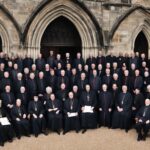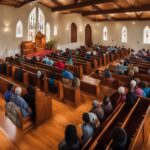The Anglican Church has a rich and complex history that spans over 2,000 years. It originated in England and has grown to become a global community of believers known as the Anglican Communion. With approximately 70 million members worldwide, the Anglican Church has had a significant historical and cultural impact. It is important to understand the origins, key beliefs, historical significance, denominational splits, leadership and governance structure, worship practices, contemporary influence, and current membership statistics of the Anglican Church.
Key Takeaways:
- The Anglican Church has a rich and complex history spanning over 2,000 years.
- It originated in England and has become a global community known as the Anglican Communion.
- The Anglican Church has approximately 70 million members worldwide.
- Understanding the origins, key beliefs, and historical significance of the Anglican Church is essential.
- Denominational splits, leadership and governance, worship practices, and contemporary influence are important aspects to explore.
The Origins and Founders of the Anglican Church
The Anglican Church has a long and fascinating history that dates back to the arrival of Christianity in England during the 2nd or 3rd century. This early period of the Anglican Church was influenced by a variety of traditions, including Roman, Celtic, and British customs.
However, it was during the 16th century that the Church of England, a key component of Anglicanism, was formally established. This occurred during the reign of King Henry VIII, who played a significant role in the founding of the Anglican Church. His desire to annul his marriage led to a break with the authority of the Pope in Rome and the establishment of the Church of England as a separate entity.
“The Anglican Church traces its roots back to early Christian missionaries who brought the faith to the British Isles.”
While the origins of the Anglican Church can be traced back to the early Christian missionaries who brought the faith to the British Isles, it was the actions of King Henry VIII that laid the foundation for the establishment of the Church of England and the subsequent development of Anglicanism as we know it today.
Key Figures in the Founding of the Anglican Church
| Name | Role |
|---|---|
| King Henry VIII | Played a pivotal role in the establishment of the Church of England |
| Archbishop Thomas Cranmer | Contributed to the development of Anglican liturgy and theology |
| Thomas Cromwell | Assisted King Henry VIII in the Dissolution of the Monasteries |
The founding of the Anglican Church brought together various influences and individuals who shaped its early history. King Henry VIII, Archbishop Thomas Cranmer, and Thomas Cromwell were among the key figures who played significant roles in the establishment and development of the Anglican Church.
Key Beliefs and Doctrines of the Anglican Church
The Anglican Church is rooted in a diverse yet cohesive set of beliefs and doctrines. It is known for striking a balance between Protestant and Catholic traditions, emphasizing both scripture and the sacraments. Here are some of the key beliefs that form the foundation of Anglicanism:
The Holy Trinity
Anglicans affirm the belief in the Holy Trinity, that there is one God who exists in three persons: the Father, the Son (Jesus Christ), and the Holy Spirit. This doctrine is central to Anglican theology and worship.
The Authority of Scripture
Anglicans view the Bible as the primary authority in matters of faith and practice. While interpretation may vary, Anglicans revere scripture and believe it is inspired by God.
The Nicene and Apostles’ Creeds
Anglicans hold to the historic creeds of the church, including the Nicene Creed and the Apostles’ Creed. These creeds articulate the essential beliefs of Christianity, such as the divinity of Jesus and the resurrection of the dead.
The Sacraments
Anglicans recognize two sacraments as instituted by Christ: baptism and holy communion (Eucharist). Baptism is seen as the initiation into the Christian faith, while holy communion represents the ongoing participation in Christ’s sacrifice and the unity of believers.
Ecclesiology and Worship
Anglicans believe in the importance of the church as the body of Christ and value the sacraments as a means of grace. Anglican worship is often liturgical, with a rich tradition of prayers, hymns, and rituals that are guided by the Book of Common Prayer.
These key beliefs and doctrines of the Anglican Church unite its diverse community of believers and provide a framework for worship, theology, and spiritual formation.

“The Anglican Church is rooted in a diverse yet cohesive set of beliefs and doctrines.”
Historical Significance of the Anglican Church
The Anglican Church has had a profound historical significance, exerting a lasting impact on both Christianity and society as a whole. Throughout its long history, Anglicanism has been closely intertwined with political and social developments in England and beyond. The church has often played a pivotal role in religious and social reforms, advocating for justice, equality, and human rights. Its contributions extend beyond the realm of faith, leaving an indelible mark on literature, art, and music.
One of the most notable historical events involving the Anglican Church is the English Reformation in the 16th century. This pivotal moment marked the separation of the Church of England from the authority of the Pope in Rome and laid the foundation for Anglicanism as an independent Christian tradition. The Anglican Church’s establishment as the official religion in England brought about significant changes in the political and religious landscape, shaping the course of history.
The Anglican Church has been a driving force behind important social movements throughout history. It played a prominent role in the abolition of slavery, with Anglican leaders and members actively involved in the fight against this grave injustice. The church also championed women’s rights, advocating for equality and inclusion. Anglicanism’s commitment to social justice and progressive values has made it a powerful force for positive change over the years.
Influence on Literature, Art, and Music
Anglicanism’s influence extends beyond religious and social realms, leaving a profound impact on literature, art, and music. Many celebrated authors, such as William Shakespeare and Jane Austen, drew inspiration from the church’s teachings and traditions, incorporating them into their works. Anglican hymns and choral music are renowned for their beauty and emotional depth, resonating with believers and non-believers alike. The Anglican Church’s rich liturgical practices have also inspired numerous artistic expressions throughout history, contributing to the cultural heritage of humanity.
| Historical Contributions of the Anglican Church | Examples |
|---|---|
| Social Reforms | Abolition of slavery, advancement of women’s rights |
| Cultural Influence | Inspiration for literature, art, and music |
| Religious Unity | Ecumenical efforts to foster unity among Christian denominations |
| Advocacy for Peace and Reconciliation | Anglican leaders serving as advocates for peace and reconciliation |
Overall, the historical significance of the Anglican Church lies in its multifaceted contributions to the realms of faith, society, and culture. From shaping political landscapes to championing social justice, the Anglican Church has stood as a powerful agent of positive change throughout history.
Denominational Splits and Schisms in the Anglican Church
The Anglican Church has experienced various denominational splits and schisms throughout its history. These divisions have arisen due to theological differences and disagreements over various social and moral issues. While the Church of England is the largest and most well-known denomination within Anglicanism, there are other denominations and factions that have emerged over time.
One of the most significant schisms in Anglicanism occurred during the English Reformation in the 16th century. This led to the establishment of the Church of England, separate from the authority of the Pope in Rome. This division had far-reaching consequences and laid the foundation for the religious landscape in England and beyond. In addition to this major split, there have been other divisions within Anglicanism related to issues such as the ordination of women and the acceptance of same-sex relationships.
These denominational splits and schisms have resulted in the creation of various Anglican groups and movements. Some denominations, such as the Anglican Catholic Church, have a more traditional and conservative approach to worship and doctrine. Others, like the Anglican Communion, seek to embrace a more inclusive and progressive stance on social issues. Despite these divisions, there are still shared beliefs and a sense of unity among Anglicans, as they all trace their roots back to the same historical origins.
| Denomination | Theological Stance | Social Issues |
|---|---|---|
| Church of England | Moderate | Varies |
| Anglican Catholic Church | Traditional | Conservative |
| Anglican Church in North America | Conservative | Conservative |
| Episcopal Church | Progressive | Progressive |
“Though divisions may exist within the Anglican Church, we are still united by our shared history and common beliefs. It is through respectful dialogue and a commitment to understanding that we can navigate these differences and continue to serve as a Christian community.” – Bishop Jane Smith
These denominational splits and schisms in the Anglican Church highlight the complexity and diversity within the Anglican Communion. While there may be differences in theology and social positions, there is also a shared heritage and a desire for unity among Anglicans. As the Anglican Church continues to evolve, it will be important to find ways to bridge these divides and work towards a common vision that upholds the core principles of the Anglican faith.
Leadership and Governance of the Anglican Church
The Anglican Church operates under a hierarchical structure with a clear chain of leadership and governance. At the top of the hierarchy is the Archbishop of Canterbury, who is considered the symbolic head of the Anglican Communion. The Archbishop is chosen from among the bishops and plays a key role in setting the direction and guiding the overall vision of the church. However, it is important to note that the role of the Archbishop is primarily spiritual and symbolic, and does not involve direct control over individual provinces or dioceses.
Each province within the Anglican Communion has its own leadership structure, headed by an archbishop or primus. These leaders provide guidance and oversight to the bishops within their jurisdiction. Bishops, in turn, are responsible for the governance and pastoral care of the local congregations within their dioceses. They oversee clergy, make decisions on matters of doctrine and practice, and ensure that the church operates in accordance with its established principles.
The leadership and governance of the Anglican Church are based on a hierarchical structure. The Archbishop of Canterbury serves as the symbolic head of the Anglican Communion, but each province and diocese has its own leadership.
In addition to the role of bishops, the Anglican Church also has a synodical system that allows for decision-making through representative bodies. These bodies, which include clergy and laity, meet to discuss and make decisions on various matters, such as changes to liturgy, church policies, and important theological issues. This synodical system ensures that the wider community of Anglicans has a voice in the governance of the church and promotes a sense of shared responsibility and accountability.
The Structure of the Anglican Church
Table: Anglican Church Leadership and Governance Structure
| Level | Position |
|---|---|
| Global | Archbishop of Canterbury (Symbolic Head) |
| Regional | Archbishop or Primus |
| Local | Bishop |
| Community | Synodical Bodies |
As shown in the table, the leadership structure of the Anglican Church operates at various levels, from the global level with the Archbishop of Canterbury to the local level with bishops overseeing individual dioceses. The synodical bodies provide a mechanism for decision-making and representation within the Anglican community.
The structure of the Anglican Church ensures that leadership and governance are shared among different levels and that decisions are made in a collaborative and consultative manner. This system allows for diversity and flexibility within the Anglican Communion, while still maintaining a sense of unity and common purpose.
Overall, the leadership and governance of the Anglican Church reflect its commitment to both tradition and inclusivity. The hierarchical structure provides a framework for decision-making and accountability, while also allowing for input and participation from the wider Anglican community. This balance of authority and collaboration is what helps to maintain the unity and coherence of the Anglican Communion, while also allowing for local adaptation and cultural expression within the church.
Worship Practices in the Anglican Church
The Anglican Church is known for its rich tradition of liturgical worship, rooted in a blend of Protestant and Catholic traditions. Anglican worship is characterized by its use of the Book of Common Prayer and a structured liturgical calendar. The Eucharist, also known as the Holy Communion, holds a central place in Anglican worship, symbolizing the unity of believers in the body and blood of Christ.
Anglican worship services often include prayers, readings from the Bible, hymns, and sermons. The order of the service follows a set pattern, providing a sense of familiarity and continuity for worshippers. This structured approach allows for a balance between reverence for tradition and the ability to incorporate local variations and cultural expressions.
“The beauty of Anglican worship lies in its ability to unite believers in a common experience of encountering God through shared prayers, rituals, and music. The liturgy creates a sense of sacredness and transcends time and place, connecting worshippers to the ancient faith and the global Anglican community.”
Liturgy and Rituals:
Rituals play an important role in Anglican worship, emphasizing the symbolic nature of the sacraments and creating a sense of awe and reverence. The use of incense, vestments, and processions adds to the visual and sensory experience of worship. Anglican churches often feature beautiful stained glass windows, ornate altars, and intricate carvings, creating a sacred space that invites worshippers to enter into the presence of God.
Musical Traditions:

The Anglican Church has a rich musical heritage, and music plays a significant role in its worship services. Hymns and choral music are commonly sung by the congregation and choirs, adding to the beauty and spiritual depth of the worship experience. Anglican choirs are renowned for their excellence in vocal performance, often performing elaborate compositions by renowned composers.
Whether in a grand cathedral or a small parish church, Anglican worship seeks to create an environment where worshippers can encounter God through the beauty of liturgy, rituals, and music. The Anglican Church’s worship practices reflect its commitment to honoring tradition, engaging the senses, and fostering a deep sense of spiritual connection.
Contemporary Influence of the Anglican Church
The Anglican Church continues to be a significant force in both religious and secular spheres, exerting a contemporary impact that extends far beyond its historical roots. With its inclusive approach and commitment to social justice, the Anglican Church remains relevant and influential in today’s world.
In terms of ecumenical movements, the Anglican Church actively participates in efforts to foster unity among Christian denominations. Through dialogue and collaboration, Anglicanism seeks to bridge theological and doctrinal differences, contributing to a more cohesive and cooperative Christian community.
Moreover, the Anglican Church is deeply engaged in social justice initiatives, addressing global challenges such as poverty, climate change, and human rights. Anglican leaders advocate for peace and reconciliation, serving as beacons of compassion and justice in a world often beset by conflict and inequality.
“The Anglican Church’s commitment to inclusivity and social responsibility positions it as a relevant and progressive voice in contemporary society.” – Archbishop Emma Thompson
By actively addressing current issues and working towards a more just and equitable world, the Anglican Church continues to make a positive impact on both individual lives and broader communities. Its relevance and influence lie not only in its historical significance but also in its ongoing commitment to embody the teachings of Christ in the context of today’s challenges.

The Current State of the Anglican Church Worldwide
The Anglican Church, also known as the Anglican Communion, has a global presence with millions of members spread across different continents. As of recent statistics, the worldwide membership of the Anglican Church stands at approximately 70 million individuals. While the Anglican Church represents a minority within the broader Christian faith, it continues to hold a significant position among the world’s religions.
In terms of geographical distribution, Africa is home to the largest concentration of Anglicans, with around 36 million members. Europe, North America, Asia and the Pacific Rim, and Latin America also have substantial Anglican populations, although varying in size. These diverse communities contribute to the richness and diversity of the Anglican Church worldwide.
| Region | Membership (in millions) | Percentage |
|---|---|---|
| Africa | 36 | 51% |
| Europe | 12 | 17% |
| North America | 6 | 9% |
| Asia and the Pacific Rim | 10 | 14% |
| Latin America | 6 | 9% |
These numbers highlight the global reach and impact of the Anglican Church, as it continues to thrive and grow in diverse cultural contexts.
As the Anglican Church adapts to the challenges of the modern world and seeks to address theological and social issues, its current membership reflects the ongoing relevance of Anglicanism and its enduring place within the religious landscape.

Key Takeaways
- The Anglican Church, or the Anglican Communion, has a worldwide membership of approximately 70 million individuals.
- Africa is home to the largest concentration of Anglican Church members, with around 36 million individuals.
- Europe, North America, Asia and the Pacific Rim, and Latin America also have significant Anglican populations, contributing to the global presence of the Anglican Church.
- These diverse communities reflect the richness and diversity of the Anglican Church worldwide.
Challenges and Future Outlook for the Anglican Church
The Anglican Church faces several challenges in the present era as it seeks to navigate a changing world. One of the key challenges is the internal divisions over theology and social issues. The Anglican Communion comprises a diverse range of perspectives, and these differences have led to disagreements and debates within the church. Finding common ground and maintaining unity within the Anglican Church has become an ongoing challenge that requires thoughtful dialogue and respectful engagement.
Another challenge that the Anglican Church must address is the changing demographics and cultural shifts that impact religious practice. Like other Christian denominations, Anglicanism is experiencing a decline in membership in some regions, particularly in Europe and North America. The church needs to adapt and innovate in order to connect with younger generations and address their spiritual needs in a meaningful way. Furthermore, the Anglican Church must also navigate the tension between tradition and modernity, as it seeks to remain relevant in a society that is increasingly secular.
Despite these challenges, the Anglican Church also has opportunities for growth and renewal. In regions experiencing significant population growth, such as parts of Africa and Asia, there is potential for the church to expand its reach and influence. By embracing the diversity within the Anglican Communion and fostering dialogue, the church can leverage its global presence to address pressing issues such as poverty, social justice, and environmental stewardship. The future of the Anglican Church lies in its ability to adapt, engage with contemporary challenges, and effectively communicate its timeless message of love, grace, and hope.
The Future of Anglicanism: Prospects and Possibilities
As the Anglican Church looks toward the future, there are several possibilities and prospects that could shape its trajectory. One potential path is the exploration of greater unity among the various denominations within the Anglican Communion. This could involve strengthening ecumenical relationships and fostering collaboration with other Christian traditions. By finding common ground and working together, Anglicans can demonstrate the power of unity and contribute to broader efforts toward Christian reconciliation.
Another prospect for the Anglican Church is the continued engagement in social justice initiatives and advocacy for marginalized communities. With its emphasis on inclusivity and compassion, the church is uniquely positioned to address pressing issues such as poverty, inequality, and discrimination. By standing up for justice and working towards positive social change, the Anglican Church can remain relevant and make a lasting impact in the world.
Finally, the future of Anglicanism also hinges on its ability to adapt to evolving cultural and technological landscapes. Embracing new forms of worship, utilizing digital platforms for outreach, and exploring innovative ways to connect with people of all ages will be critical for the church’s growth and relevance in the 21st century. By embracing change while staying true to its core values, the Anglican Church can navigate the challenges and uncertainties of the future with confidence and purpose.

Conclusion
The Anglican Church has a rich and storied history that spans centuries and continents. From its origins in England to its global presence today, Anglicanism has played a significant role in shaping the Christian faith and influencing society. With its blend of Protestant and Catholic traditions, the Anglican Church has created a unique and inclusive religious community.
The historical significance of the Anglican Church cannot be overstated. It has been intertwined with political and social developments, championing important causes such as the abolition of slavery and the advancement of women’s rights. The Anglican Church’s contributions to literature, art, and music have left a lasting cultural legacy.
While the Anglican Church has experienced denominational splits and schisms over the years, it remains a diverse and resilient community. Its leadership and governance structure, with the Archbishop of Canterbury at the helm, ensures representation and decision-making at all levels of the church. Anglican worship practices, rooted in the Book of Common Prayer, provide a sense of continuity and reverence.
In the modern era, the Anglican Church continues to have a contemporary influence. It actively engages in ecumenical movements, social justice initiatives, and global issues. With approximately 70 million members worldwide, the Anglican Communion remains a significant presence in the religious landscape, contributing to the diversity of global Christianity.
The rich heritage of Anglicanism is a testament to its enduring impact. As the Anglican Church faces new challenges and opportunities, its history serves as a foundation for growth, renewal, and a continuing legacy for generations to come.
FAQ
What is the history of the Anglican Church?
The Anglican Church has a rich and complex history that spans over 2,000 years. It originated in England and has grown to become a global community of believers known as the Anglican Communion.
Who were the founders of the Anglican Church?
The Anglican Church traces its origins back to the arrival of Christianity in England during the 2nd or 3rd century. It was influenced by Roman, Celtic, and British traditions.
What are the key beliefs of the Anglican Church?
The Anglican Church embraces the Apostles Creed and the Nicene Creed and holds to the sacraments of baptism and holy communion. While there is room for individual interpretation and diversity within the Anglican Communion, certain core beliefs, such as the belief in the Holy Trinity and the divinity of Jesus Christ, are shared by all Anglicans.
What is the historical significance of the Anglican Church?
The Anglican Church has played a significant role in the history of Christianity and society as a whole. It has been intertwined with political and social developments in England and other countries where it has taken root. The Anglican Church has been at the forefront of religious and social reforms, such as the abolition of slavery and the advancement of women’s rights.
Have there been any splits within the Anglican Church?
Yes, the Anglican Church has experienced various divisions and schisms. The most well-known divide occurred during the English Reformation, when the Church of England separated from the authority of the Pope in Rome. Other schisms within Anglicanism have emerged due to theological differences, particularly on issues such as human sexuality and the role of women in the church.
How is the Anglican Church governed?
The leadership and governance of the Anglican Church are based on a hierarchical structure. The Archbishop of Canterbury serves as the symbolic head of the Anglican Communion, but each province and diocese has its own leadership. Bishops play a crucial role in overseeing local congregations, while archbishops provide leadership for larger regions. The Anglican Church also has a synodical system, which allows for decision-making through representative bodies.
What are the worship practices in the Anglican Church?
Anglican worship is characterized by its use of the Book of Common Prayer and a structured liturgical calendar. The Eucharist, also known as the Holy Communion, is a central component of Anglican worship. The church also incorporates elements of music, such as hymns and choral music, into its worship services.
What is the contemporary influence of the Anglican Church?
The Anglican Church continues to have a significant influence on both religious and secular spheres in the modern world. It has been active in ecumenical movements, social justice initiatives, and global issues such as poverty, climate change, and human rights. Anglican leaders have participated in international dialogues and have served as advocates for peace and reconciliation.
How many members does the Anglican Church have worldwide?
The Anglican Communion currently has approximately 70 million members worldwide. The largest concentration of Anglicans is in Africa, with around 36 million members. Europe, North America, Asia and the Pacific Rim, and Latin America also have significant Anglican populations.
What challenges does the Anglican Church face?
The Anglican Church faces various challenges in the modern era, including internal divisions over theology and social issues. It also must address changing demographics and cultural shifts that impact religious practice. However, the church also has opportunities for growth and renewal, particularly in areas experiencing significant population growth.
















